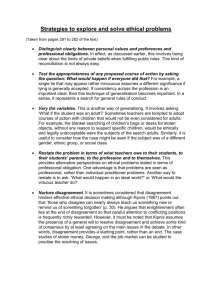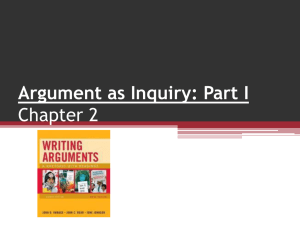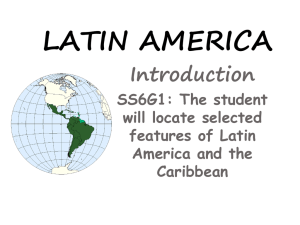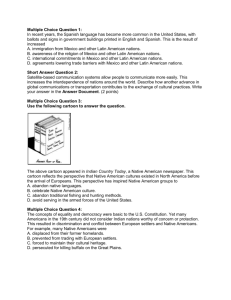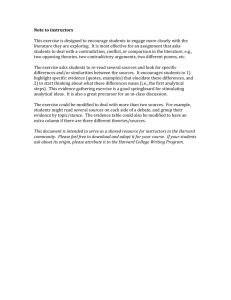PREPARING A POSITION PAPER
advertisement
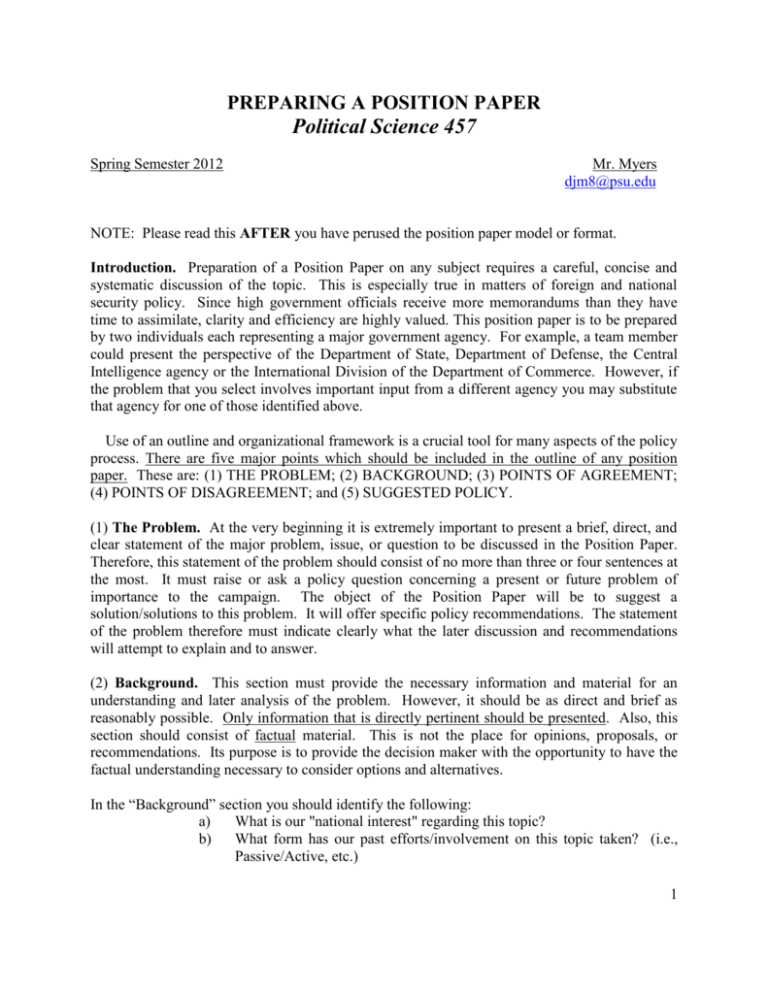
PREPARING A POSITION PAPER Political Science 457 Spring Semester 2012 Mr. Myers djm8@psu.edu NOTE: Please read this AFTER you have perused the position paper model or format. Introduction. Preparation of a Position Paper on any subject requires a careful, concise and systematic discussion of the topic. This is especially true in matters of foreign and national security policy. Since high government officials receive more memorandums than they have time to assimilate, clarity and efficiency are highly valued. This position paper is to be prepared by two individuals each representing a major government agency. For example, a team member could present the perspective of the Department of State, Department of Defense, the Central Intelligence agency or the International Division of the Department of Commerce. However, if the problem that you select involves important input from a different agency you may substitute that agency for one of those identified above. Use of an outline and organizational framework is a crucial tool for many aspects of the policy process. There are five major points which should be included in the outline of any position paper. These are: (1) THE PROBLEM; (2) BACKGROUND; (3) POINTS OF AGREEMENT; (4) POINTS OF DISAGREEMENT; and (5) SUGGESTED POLICY. (1) The Problem. At the very beginning it is extremely important to present a brief, direct, and clear statement of the major problem, issue, or question to be discussed in the Position Paper. Therefore, this statement of the problem should consist of no more than three or four sentences at the most. It must raise or ask a policy question concerning a present or future problem of importance to the campaign. The object of the Position Paper will be to suggest a solution/solutions to this problem. It will offer specific policy recommendations. The statement of the problem therefore must indicate clearly what the later discussion and recommendations will attempt to explain and to answer. (2) Background. This section must provide the necessary information and material for an understanding and later analysis of the problem. However, it should be as direct and brief as reasonably possible. Only information that is directly pertinent should be presented. Also, this section should consist of factual material. This is not the place for opinions, proposals, or recommendations. Its purpose is to provide the decision maker with the opportunity to have the factual understanding necessary to consider options and alternatives. In the “Background” section you should identify the following: a) What is our "national interest" regarding this topic? b) What form has our past efforts/involvement on this topic taken? (i.e., Passive/Active, etc.) 1 c) d) Identify the overriding political, economic, cultural or regional issues that may affect your policy suggestions. What other country/countries are involved in this issue? Why? Generally this section should be no longer than 3 pages. If it is longer, this is too much. Remember, it is easier to prepare this section after having first written the sections on Points of Agreement and Points of Disagreement. 3) Points of Agreement. This section should be written in short, direct, and clear sentences. Individual paragraphs will set forth ideas, interpretations, and points of view on which there is a fairly general agreement. You should have clear sources of opinion -- that is, concrete bases for the points of agreement that are specified. For each individual point, you should indicate if possible those sources, persons, or groups that favor the point. These section deal with agreement among your sources, not those points with which you agree. Whether you agree or disagree with a point of view is irrelevant and unimportant in this context, as you are only a reporting officer. For most topics, you should have 4 to 7 Points of Agreement (PoA). When writing this section of the paper, you should state each point briefly, in a sentence or two. Then you should list the sources that agree in bodynote form. (There should be a minimum of two sources for each point.) After this, each point should be discussed in a short paragraph. At the end of the presentation of all your points, you should include a section (a page or so) that integrates, discusses and interrelates all of the points. You should also address any basic underlying issues that would affect your broader policy perspective. 4) Points of Disagreement. This section is similar in format and presentation to the Points of Agreement. However, points of disagreement are of course those on which there is a clear, even fundamental lack of agreement. Major sources of opinion and analysis should differ with one another. You should first list the basic character of the disagreement; then the conflicting ideas or points of view should be set forth and explained. For most topics, you should have 3 to 5 Points of Disagreement (PoD). When writing this section of the paper, you should state each point briefly, in a sentence or two. Each “Point of Disagreement” should describe the disagreement that you are describing. Points of Disagreement must have at least two paragraphs, one for each side of the disagreement. Then you should list the sources that disagree in body-note form. (There should be a minimum of two sources for each point.) At the end of the presentation of all your points, you should include a section (a page or so) which integrates, discusses and interrelates all of the points. You should also address any basic underlying areas of controversy that could affect you broader policy perspective. 2 5) Suggested Policy. This is the most important section. It should contain proposal(s) for policies that deal directly with the initial statement of the problem. Each policy should be discussed in view of the findings presented in the points of agreement and disagreement. In other words, the basis for a particular policy should be evident from the content of the previous discussions. This is the section where the author reveals his or her own views, insights, and analyses. There should be some original thought and ideas, supported and documented by the views and opinions of others where possible. The suggested policy may consist of a PREFERRED policy, followed by other, less attractive alternatives. Another way is to set forth several interrelated policies of more or less equal strength and importance. Suggested policies should first be listed, and then discussed in the paragraphs to follow. REMEMBER: The intent of this paper is to persuade the Secretary of State or the Director of National Intelligence to accept your preferred policy, or at least incorporate your suggestions into official policy statements. (SEE THE ACCOMPANYING PAPERS FOR CONCRETE EXAMPLES OF A POSITION PAPER WHICH WILL ILLUSTRATE THE FORMAT IN PRACTICAL TERMS) IN ADDITION: Do not use contractions. Do not use the word "feel;" use the words "believe, " "think," "contend," "maintain," "lean toward." One does not "feel" foreign and national security policy. This is a formal paper, and your writing style should reflect this fact. It should not be casual and you should not use slang, colloquialisms, abbreviations or a preponderance of pronouns. 3 David J. Myers djm8@psu.edu Political Science 457 Spring Semester 2012 SAMPLE OR MODEL: For the POSITION PAPER PROPOSAL(due before February 10) Your position paper proposal should be given to Dr. Myers soon after your team schedules an appointment to discuss your plans for this assignment. As noted in the syllabus, this proposal and the accompanying conference account for 5 percent of your total grade. Position paper proposals must be handed in no later than one day prior to the scheduled conference. Statement of the Problem In the light of the events of September 11, 2001 what revisions can be made in the Rio Pact alliance that will allow it to serve better the security interests of the United States and Latin America? Tentative Plans for Research I plan to draw on a wide variety of source materials dating from the beginnings of the Inter-American Treaty of Reciprocal Assistance right on up through the present time. Hopefully, by supplementing information from texts with more current analyses from periodicals and government documents, I will gain a good cross-section of representative thought on the past and current remedies and potential reforms which have taken place. This should enable me to make some intelligent judgments about what options are open to the United States and other states comprising the Rio Pact. I suspect that one of my problems in research will be in editing the wealth of available material concerning problems of and prospects for the Inter-American Treaty for Reciprocal Assistance (Rio Pact). I believe that I may have tackled too much in my bibliography and will perhaps have to trim down some of the less recent sources*. The decision as to which sources are expendable or less relevant will be difficult and I will have to try to remain objective in my 4 decision as to which can go. * Note, most of the older materials have been eliminated from the bibliography (as revised). Bibliography Books: 1. 2. 3. 4. Beans, Charles. Treaties and Other International Agreements of the United States. Department of State Publication 8521, 1970. Fedder, Edwin H. TIAR in the Seventies. St. Louis: University of Missouri, 1999. Goodman, Elliot R. Fate of the Caribbean Community. New York: Praeger, 1985. Steele, Ronald. "The Southern Cone Mirage," Contemporary American Foreign and Military Policy, B.M. Sapin, ed. Glenview: Scott, Foresman, and Co., 1995. Periodicals: 5. 6. 7. 8. 9. 10. 11. 12. 13. 14. 15. 16. 17. 18. Ball, Robert. "The Rio Pact Needs a Fresh Breeze," Fortune. February, 1994. Brandon, D. "Union Now: An Idea Whose Time Has come," America, May 3, 1975. Fromkin, David. "Entangling Alliances," Foreign Affairs, July, 2001. Hillenbrand, Martin J. "Panama and U.S. Security Interests," Department of State Bulletin, November 8, 1981. Joyce, James A. "Toward Ending the Cold War in Latin America," War and Peace Report, May, 1994. Kissinger, Henry A. "America's Destiny: The Global Context," Department of State Bulletin, March 1, 1996. Kissinger, Henry A. "Southern Alliance: Peace and Moral Purpose," Department of State Bulletin, July 26, 1976. Levine, H.S. "Who Leads the Alliance? The Rio Pact and the U.S. in Pacific South America," Nation, October 18, 1996. Powell, Colin. "Are Our Military Alliances Meaningful?" Annals of the American Academy of Political and Social Science, July, 1969. Reich, Otto. "America's Move," Foreign Affairs, January, 1999. Schilling, Juetgen. "If the Soviets Leave Cuba?," Military Review, June, 1988. Summers, Donna. "Uncommon Heritage, A common Challenge: The Ibero-American Link," Department of State Bulletin, March 22, 1999. Vance, C. W. "Abdication of Argentina: Excerpt from Lost Atlantis," New Republic, January 21, 2002. Mora, Frank, "The Southern Command Looks Ahead," Atlantic Community Quarterly, Fall, 2009. 5 SPRING 2012 Political Science 457 Remember: your policy paper is due on Monday, April 16 MODEL OR FORMAT FOR POSITION PAPER THE PROBLEM What policy should the United States adopt with regard to military intervention in El Caribe? (NOTE: The statement of the problem should generally consist of a single sentence which posits a policy question concerning a present or future problem. The object of the paper will be to suggest a solution(s) to this problem in the term of a specific policy recommendation(s). The problem should therefore be stated with this in mind.) BACKGROUND* Following the consolidation of Hugo Chávez ’s regime in Venezuela, United States interest in El Caribe's security began to increase. El Caribe's government felt threatened, and its leaders historically were allies of the United States (3 Heywood, 208). Recently, this interest has widened, due in large part to the increasing strategic importance of El Caribe's petroleum and bauxite. El Caribe's location also gives it the potential to command the sea lanes through which United States shipping will have to pass in the event of an outbreak of conventional fighting in the Middle East. Finally, it has been suggested by some observers that renewed insurgency in El Caribe's northern mountains is being assisted by Hugo Chávez and Raul Castro. (7. Jackson, 18; 10. La Republica, 112.) (NOTE: This section should include only background information which is essential to understanding the problem, and should consist of "factual" information, rather than individual points of view. If this section is more than about 2 pages in length, it is too long. It is usually easier to prepare this section after finishing the Points of Agreement and Points of Disagreement section.) * For an imaginary problem. POINTS OF AGREEMENT** 1. The absence of hostile modern military forces in El Caribe is essential for the rapid resupply of friendly forces in Eastern Europe and the Middle East. (2. Beard, 201; 3. Heywood, 210-212; 6. Gianelli, 19; 11. U.S. Senate, 576). 3 [BRIEF explanation of point one] 2. A steady supply of El Caribe bauxite and petroleum is threatened by the present insurgency, (4. Bradley, 7; 5. Frazier, 403; 5. Jackson, 119; 8. Monroe, 96-99; 12. U.S. Senate, 83). [BRIEF explanation of point two] 3. Etc. 4. Etc. [Discuss and Interrelate]: El Caribe borders on the Caribbean and the Gulf of Venezuela. Military analysts consider it an especially strategic location for submarine bases (2. Beard, 201) . .. [NOTE: The above paragraphs list, and then discuss, those points of view on which the majority of your sources agree -- in other words, those points on which there exist a general consensus, but rarely unanimity. Each source which subscribes to a particular point should be listed following the point, as well as referred to specifically (including page reference) in the discuss.] ** Discuss and explain each point briefly after it is listed. Then, in a comprehensive manner, discuss, interrelate and analyze all these points at the end of this section. POINTS OF DISAGREEMENT*** 1. The supply of petroleum is nearing extinction. (6. Gianelle, 201, claims liquid petroleum reserves will be exhausted within 24 months); (8. Monroe, 93, argues that the reserves will last beyond 2050). [BRIEF analysis of the core disagreement of point one] 2. The country of El Caribe is still considered to be within the U.S. sphere of influence. (1. Amador, 84 argues affirmatively); (9. N.Y. Times denies this is so). [BRIEF analysis of the core disagreement of point two] 3. Etc. 4. Etc. 4 [Discuss and Interrelate]: Disagreement between Amador and the New York Times over whether El Caribe falls into the United States sphere of influence derives from differing assessments of changes in Chinese military capabilities since 2005. This in turn relates to the quantity and quality of military power Washington . . . . . . [NOTE: This section is similar in format to the Points of Agreement, except points of disagreement are points on which there is a fundamental lack of agreement among your sources. In other words, minority points of view exist among your sources. The core of the disagreement should be listed first, then discussed, in terms of the conflicting positions taken by your sources. *** Discuss and explain each point briefly after it is listed. Then discuss, interrelate and analyze all these points at the end of this section. SUGGESTED POLICY 1. Preferable: The United States should dispatch at once a sufficient number of troops and naval units to protect the major bauxite and petroleum deposits from the present insurgency. 2. First Alternative: The Washington should bring El Caribe counter- insurgency and naval units to the Unites States for training. 3. Second Alternative: Etc. - - - - [Discuss and Interrelate]: It appears likely that the rich petroleum and bauxite deposits located throughout El Caribe are soon to become a prize of war. The Department of Defense has underscored the importance of these resources to the northern industrial countries. This is interpreted as . . . [NOTE: This section should provide a suggested policy (or policies) which directly addresses the statement of the problem. Each policy should be discussed in view of the findings presented in the points of agreement and disagreement. In other words, the basis for your particular policy should be evident from the content of your previous discussions. This is the section in which the author reveals his/her own views and insights -- and, hopefully, demonstrates some original thought, bolstered and documented by the views and opinions of others. The suggested policy may consist of a preferable policy followed by less and less attractive alternatives; or, the author may wish to set forth a number of interrelated and coequal policies. Again, suggested policies should first be listed and then discussed in subsequent paragraphs. This section counts for one quarter of the grade for 5 the policy position project (total value of project is 30% of course total).] BIBLIOGRAPHY (imaginary) Books: 1. Amador, Carlos. China and the Diluting of Yankee Hegemony in the Caribbean. Havana: Marti Books, 2010. 2. Berrinho, Joao. Brazil Surpasses Argentina. Rio de Janeiro: Carioca Books, 2009. 3. Heywood, Spencer. Importance of Missile Equivalency in the Western Hemisphere . Chicago: Popular Books, 1997. 4. Bradley, William. "Military Capability and UNASUR," Defense Review, Spring 2009, 6-42. 5. Frazier, Walter. "The Importance of Lithium, "Science, Vol. X, May 1975, 399-475. 6. Gianelli, John. "Smuggling in Central America," International Geographic Review, Winter 1999, 200-211. 7. Jackson, Phillip. "Brazil: Superstar on the Horizon, "World Events, September 19, 2011, 16-44. 8. Monroe, Earl. "On Aluminum, "Semiconductor Review, Fall 2005, 92-118. Newspapers: 9. Livingston, Stanley. "Colombia in Perspective, "New York Times,” May 16, 2000, 7A. 10. Wambino, Jorge. "Chávez Resists Imperialism,"Correo de Orinoco,” June 20, 2011, 11-12. Documents: 11. Fire in the Andes: Hearing. Committee on Foreign Relations, U.S. Senate (Report No. 1520, 92 Congress). Washington: Government Printing Office, Doc. No. 870, 2010 12. Conduct of Venezuelan Defense Policy: Hearing. Committee on Foreign Relations, U.S. Senate (Report No. 1918, 92 Congress, 2 Sess.), Washington: Government Printing Office, Doc. No. 999, 2010. ADDITIONAL EXPLANATORY NOTES: 1. This problem, as well as all other material in this sample policy paper, is fictional. 2. "Bodynotes" will be used in the position paper in place of footnotes. Each bodynote 6 will refer to the number assigned the source in the bibliography, the author's last name, and the page(s) reference. Revised 1/16/2012 7 Latin American International Relations Political Science 457 Spring 2002 Suggested Position Paper Topics 1. What kinds of new controls should the Bush Administration implement over immigration from Mexico and the Caribbean 2. Should the United States give priority to including of Central America in a North American Common Market (NAFTA) 3. Should the United States push for the inclusion of Chile in NAFTA? 4. Should Washington offer special incentives to increase and secure gas and oil from Mexico and Venezuela? 5. Expansion of Caribbean Basin Initiative 6. Should the United States reposition its military forces to maximize its leverage in the Caribbean Basin. 7. Enterprise for the Americas Initiative. 8. What kinds of assistance that should be given to Haiti between 2002 and 2007?. 9. Kinds of support that should be offered for pluralistic democratic governments in the Caribbean Basin. 10. How can the United States government best protect US private investment in Latin America. 11. Rescheduling the foreign debt of Argentina and reactivating that country’s economy. 12. Expansion of NAFTA into a “Free Trade Zone of the America’s”. 13. Use of “Special Operations” units of the Delta Force, the Seals and the CIA to advance US interests in Latin America. 14. Decertifying Mexico for drug violations. 15. Decertifying Columbia for drug violations. 16. Legalization of Cocaine within the United States in cooperation with Colombia, Peru and Bolivia. 17. Improving diplomatic relations with Cuba. 18. Repealing the Helms-Burton Law. 19. Sale of sophisticated weapons to Latin American militaries. 20. Government to government foreign aid. 21. Increasing the influence of the OAS in Western Hemispheric politics 22. Stabilization of prices paid for raw materials from Latin America. 8 23. Discouraging Nuclear proliferation in Latin America. 24. Supporting efforts to strengthen MERCOSUR 25. Chilean-Peruvian-Bolivian Border dispute. 26. Kinds of pressure that should be brought to bear in order to root out terrorist networks and “sleeper” terrorist cells in Latin America. 27. Relocation of manufacturing plants to Mexico. 28. Training of Latin American Police forces. 29. Training of Latin American military forces. 30. Extent to which the United States should play an active role in resolving the problem (rebellion?) in Chiapas rebellion. 31. Reactivation of special US/Brazil relationship. 32. Reducing Drug Smuggling 33. Puerto Rican Nationalism. 34. Intensifying efforts to strengthen the capability of Colombia’s military to deal with the guerrillas 35. Pressuring Andean Pact members to reduce restrictions on foreign investment. 36. Making the RIO pact (TIAR) more meaningful 37. Pressuring Mexico to Enforce Environmental Regulations. 38. Revision of Rules regulating technology transfers to Latin America. 39. Reorganization of Latin American policy process in Washington. 40. Constructing a sea level Panama Canal 41. Senate ratification of the Pact of Bogota (Treaty for Settlement of Disputes). 42. Role of support for human rights in US/Latin American Policy. 43. Establishment of English as the official language of the United States. 44. Withdrawal From Guantanamo Bay. 45. Promotion of Democracy in Latin America 46. Increasing pressure on Latin American states to accept free trade Note: You could also choose topics for policy makers in a Latin American country. Examples would be: 1. Should Brazil seek to prevent the merger of MERCOSUR with NAFTA? 9 2. Should Brazil fortify her river boundaries with her Amazon neighbors? 3. Should Brazil add to existing investment in its indigenous weapons industry? 4. Should Venezuela assist the Colombian guerrillas? 5. Should Argentina maintain its “near” nuclear capacity? 6. Should Mexico allow foreign observers in to monitor elections in Chiapas? 7. To what extent should Mexico cooperate with the DEA of the United States to control the sale and shipment of drugs? 8. What (if anything) should Mexico do to attract more retirees from the United States? 9. Should Peru attempt to regain by force territory occupied by Ecuador but claimed by Peru? 10. What steps should the Cuban government take to make it more difficult for the United States to carry on with its efforts to isolate Cuba from the rest of the world. 10
